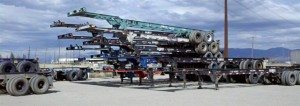Chassis shortages reported in Southern California
Excerpt from American Shipper | Tuesday, July 01, 2014 | By Chris Dupin
Some marine terminals in Southern California have been finding themselves short of chassis in recent weeks. Last Friday, PierPass — a non-profit company created by marine terminal operators at the ports of Los Angeles and Long Beach in 2005 to address multi-terminal issues such as congestion, security and air quality — issued a statement in which it said it “has been notified by several terminal operators of chassis shortages.”
It told customers, “We strongly encourage your drivers to please bring in an export, empty or bare chassis when picking up an import.”
Bruce Wargo, the president of PierPass, said on Monday, “It is my impression that as chassis are migrating to pool operators, there is a learning curve on how many chassis to position where and when. “I don’t want to use the term ‘perfect storm’ again because everybody uses it, but when you have the holiday coming, contract issues being negotiated, G6 and other alliances arriving with lots of containers — the chassis requirements become pretty critical,” said Wargo. “I’m hearing that some truckers may be hoarding chassis in case there is a strike.”
He said it appeared complaints about chassis and chassis shortages peaked last week. Even while terminals are typically busiest on the weekend and at the start of the week, on Monday, he said, “The port was busy but not out of control, though there are still some challenges at terminals.” Fred Johring, the president of Golden State Express and chairman of the Harbor Trucking Association, said he’s seen “a great deal of frustration” regarding the availability of chassis.
“We get emails every day from any number of terminals saying they are short, bring your own chassis. The only way that work is if you happen to have one of their empties sitting in your yard waiting to terminate, which is not very probable,” he said. According to Johring, the shortage has been “getting worse” within the past two weeks. “I don’t see that it is chassis any more than it is congestion,” he said. “As these big vessels have started coming in, it has taken these terminals to their knees.” He said a number of terminals are being overwhelmed by the large numbers of containers that are being discharged from larger ships, which are calling the ports in greater numbers.
Art Wong, a spokesman for the Port of Long Beach, said it appears that some shippers have increased imports in advance of today’s expiration of the current contract between the International Longshore and Warehouse Union and employers represented by the Pacific Maritime Association. While it is widely expected the talks will continue in the days ahead as the two sides try to forge a new contract, some shippers have been concerned about the possibility of a work slowdown or stoppage if the two sides come to loggerheads.
Wong said it appears that some shippers “took their containers with their chassis, and they are not bringing them back, and there hasn’t been lot of urgency on their part because they just wanted to get the boxes in and out of the port. There is a little bit of shortage because that surge of cargo is just sort of sitting out and around here in Southern California.” In addition, he said also knows that some carriers are moving away from ownership of chassis. “The back-ups are longer than they might otherwise be, but a little bit of congestion at this time was expected,” he said, adding that it’s because of the heavy movement of cargo around the contract expiration date.
One good piece of news for shippers is that Johring said he has seen no evidence that the problems are in any way related to a work slowdown by longshoremen or other labor-related issues in advance of today’s contract expiration.
When terminals do not have chassis, Johring said, “Your only other source of chassis would be a chassis pool.” He noted that pools usually only open during the day, typically between 8 a.m. and 4 p.m. or 5 p.m., and not when many truckers are moving containers in and out of marine terminals. “Productivity for my company is probably at an all-time low,” said Johring. “It’s probably even worse than before PierPass.”
He said trucking companies measure productivity by turn times and turn times per truck per shift — “any way you measure it, its not good.” He also said more trucks are making “dry runs,” where they are unable to pick up a container because it will be hours before they can get service or there are no chassis. “The incidence of that has gone up dramatically in the last few months,” he said. Johring added that there’s not much that can be done about the situation.
“You have a choice — you wait for hours for a chassis to come in, which is a gamble, and it is not a very high-odds gamble, so we just reassign a driver to another load, so we have enough loads to move, and we end up charging the customer for a dry run as a result. The customers are not very happy. We tell them this is between you and your steamship line that you have contracted with. It has nothing to do with trucking.” He said he charges $75 for a dry run, and he notes he has to pay the driver with that money. Johring said that when terminals are out of chassis, they will not postpone the “last free day” for containers on their terminal, which means additional expense for shippers.

